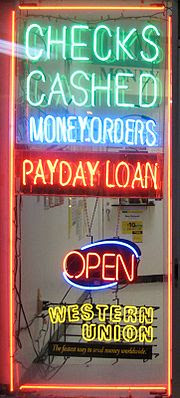
A payday loan (also called a paycheck advance or payday advance) is a small, short-term loan that is intended to cover a borrower's expenses until his or her next payday. The loans are also sometimes referred to as cash advances, though that term can also refer to cash provided against a prearranged line of credit such as a credit card (see cash advance). Legislation regarding payday loans varies widely between different countries and, within the USA, between different states.
Some jurisdictions impose strict usury limits, limiting the nominal annual percentage rate (APR) that any lender, including payday lenders, can charge; some outlaw payday lending entirely; and some have very few restrictions on payday lenders. Due to the extremely short-term nature of payday loans, the difference between APR and effective annual rate (EAR) can be substantial, because EAR takes compounding into account. For a $15 charge on a $100 2-week payday loan, the APR is 26 × 15% = 390% but the EAR is 1.1526 - 1 × 100% = 3686%. Careful reporting of whether EAR or APR is quoted is necessary to make meaningful comparisons.
FOR MORE VISIT-http://www.guardian.co.uk/money/2008/jun/29/interestrates.internet
http://www.denverpost.com/ci_8298922?source=bb
http://www.readthehook.com/stories/2008/01/31/TOUGHCUSTOMER-0705.rtf.aspx




